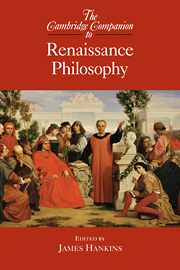Book contents
- Frontmatter
- 1 Introduction
- Part I Continuity and Revival
- Part II Toward Modern Philosophy
- 9 Nicholas of Cusa and modern philosophy
- 10 Lorenzo Valla and the rise of humanist dialectic
- 11 The immortality of the soul
- 12 Philosophy and the crisis of religion
- 13 Hispanic scholastic philosophy
- 14 New visions of the cosmos
- 15 Organizations of knowledge
- 16 Humanistic and scholastic ethics
- 17 The problem of the prince
- 18 The significance of Renaissance philosophy
- Appendix: Brief biographies of Renaissance philosophers
- Bibliography
- Index
10 - Lorenzo Valla and the rise of humanist dialectic
from Part II - Toward Modern Philosophy
Published online by Cambridge University Press: 28 November 2007
- Frontmatter
- 1 Introduction
- Part I Continuity and Revival
- Part II Toward Modern Philosophy
- 9 Nicholas of Cusa and modern philosophy
- 10 Lorenzo Valla and the rise of humanist dialectic
- 11 The immortality of the soul
- 12 Philosophy and the crisis of religion
- 13 Hispanic scholastic philosophy
- 14 New visions of the cosmos
- 15 Organizations of knowledge
- 16 Humanistic and scholastic ethics
- 17 The problem of the prince
- 18 The significance of Renaissance philosophy
- Appendix: Brief biographies of Renaissance philosophers
- Bibliography
- Index
Summary
Humanism and scholasticism
In the Renaissance there were two main approaches to the study and teaching of language. Though the period is traditionally associated with the development of humanism, scholasticism was far from dead. University arts courses continued to be based on the Aristotelian Organon and the specialized textbooks of late medieval logic. In Italy, the cradle of humanism, this logic was imported from the mid-fourteenth century onward where it flourished throughout the fifteenth century, with Paul of Venice’s Logica parva as one of the most important textbooks. Apart from a host of technical logical issues which were being discussed, broader issues continued to provoke debate, such as whether words signify concepts or things and whether language was naturally or conventionally significant, and there was no lack of subtle answers. However hostile to the “pettifogging schoolmen” they professed to be, early modern philosophers such as Descartes, Hobbes, and Locke were obviously indebted to their ideas, and often their own theories consisted in a simplification and revision of scholastic terminology and distinctions without radically changing the linguistic paradigm.
The rise and growth of humanism, however, is the most visible sign of change in the Renaissance (though its origins went back to the late thirteenth century), and it is to the humanists’ reform of the arts of the trivium that this chapter is devoted. Obviously, this is a huge theme, and no attempt has been made here to cram into the space of one book chapter all the important names and their works - Valla, Agricola, Erasmus, Sturm, Vives, Lefèvre d’Étaples, Latomus, Melanchthon, Ramus, to mention just a few key figures.
- Type
- Chapter
- Information
- The Cambridge Companion to Renaissance Philosophy , pp. 193 - 210Publisher: Cambridge University PressPrint publication year: 2007
- 8
- Cited by

